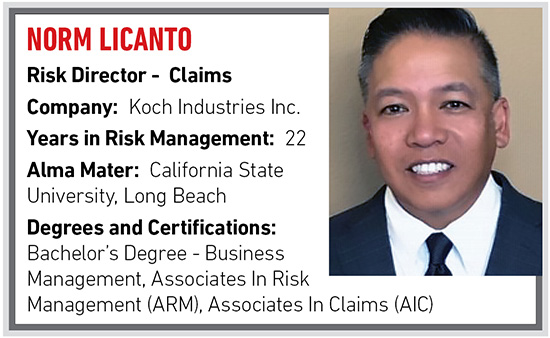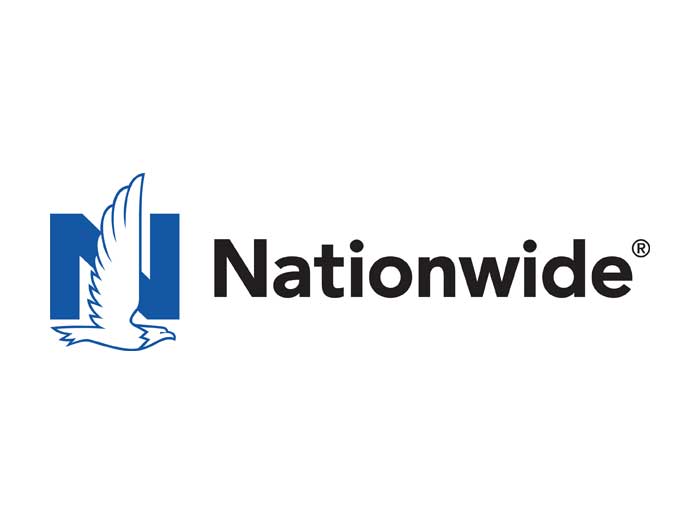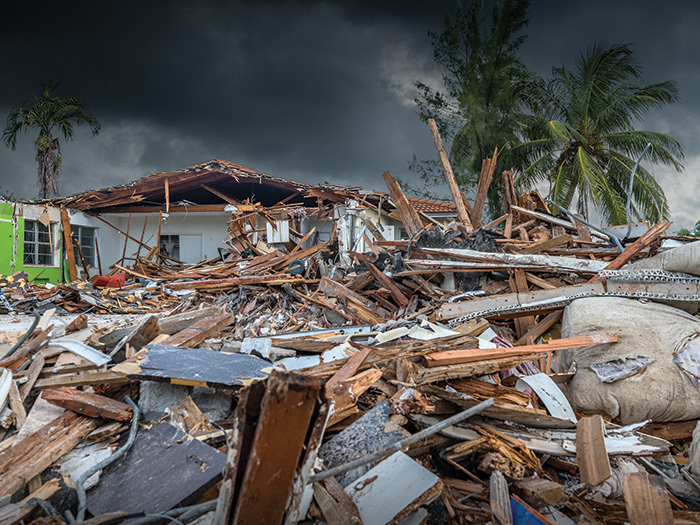Koch Industries’ Norm Licanto Talks Risk Management, from Culture’s Importance to Technology’s Vital Role

R&I: What was your first job?
I had my first job when I was 16 years old, and I was actually working as a prep cook for a small Japanese restaurant on a little island called Guam.
My dad retired from the U.S. Navy. His last base was on Guam, and so I basically was raised there.
R&I: How did you come to your current position?
Koch Industries is a very large and diversified organization. I first worked in 2011 for one of their businesses, Georgia-Pacific, and I was a regional workers’ compensation claims manager.
In 2019, Koch Industries consolidated the risk management organization into one group. The Georgia-Pacific risk management organization became part of Koch Industries’ risk optimization group. I manage the claims and workers’ compensation team within this large risk management group.
R&I: What’s been the biggest change in risk management and the insurance industry since you’ve been in it?
I’ve been in the workers’ compensation risk management industry for over 23 years. I think the biggest change, in my opinion, has been technology, specifically utilizing technology.
For example, automation or artificial intelligence and using large data sets to create operational efficiencies and to look for opportunities.
R&I: How else would you say technology has impacted the risk management profession?
Let’s take artificial intelligence as an example and big data analytics as another example.
Back in the day — and I’m going to date myself — we never heard of predictive modeling in risk management or in workers’ comp, right? But we have that today through technology. And then it’s also creating new tools.
So going back to that decision-making process, it is making the decisions a lot more sound, a little more scientific, and then it’s also creating operational efficiencies.
R&I: What’s the biggest challenge you’ve faced in your career?
I’ll use workers’ compensation as an example since that’s been my emphasis for all these years. In the workers’ compensation programs that I’ve led, the biggest challenge would be changing what we call the mental models of our customers.
My customers are our injured colleagues, business leaders and partners within the workers’ compensation program.
In our current program, for example, we emphasize advocacy, and it’s a customer experience. One of the challenges is changing the culture in workers’ comp from being adversarial to being an advocate.
And if we think in Koch’s principles, what we’re trying to do is create virtuous cycles of mutual benefit. Benefits for our injured colleagues, our businesses and our external partners.
R&I: Who has been your mentor(s) and why?
I would say first and foremost my parents. My dad was a 26-year veteran in the United States Navy. And as we all know about the military, they teach you how to be disciplined and to always be humble. That’s what I learned from my dad.
My mom taught me it’s all about the family. One of her favorite things to say was, “When you become a father and a husband, always take care of your family.” That has stuck with me my entire life.
In terms of business and my career, [he’s] not really an intimate mentor per se, because I’ve never met or spoken to Mr. Koch, who is a major shareholder for Koch Industries.
But learning how to apply his market-based principles, called MBM, for example, in our workers’ comp program, has been mentorship for me. I read it in his books, and I learn from our internal organizational trainings and principles that make up the foundation of MBM; like integrity, humility, respect, stewardship and compliance.
They’re all gospel for Mr. Koch and his organization. So, that’s been a mentorship for me as well.
R&I: What is the risk management community doing right?
I think it’s going back to those changes, right? So it’s focusing on data to drive risk management decisions and then using the analysis from the data to influence decisions in your organization or your organization’s leadership. Whether it’s a large project involving risk taking or even buying insurance.
R&I: What could the risk management community be doing a better job of?
It’s something that we at Koch call “the principle of transformation.” We strive to transform ourselves and the company. And I think the risk management community should strive to transform as well.
Transform the risk management practice with new and fresh ideas and also transform the risk management industry with new people. Get the millennials interested in risk management.
R&I: What role does company culture play in guiding workers’ compensation programs?
It obviously plays a major role, especially at Koch.
I talked about the MBM principles. The entire Koch organization is driven by those guiding principles. As an example, I talked earlier about the workers’ comp advocacy program being centered on the customer experience. Again, one of our major customers is our injured colleagues.
This has MBM principles rooted in the advocacy program. Stewardship and compliance, which is proper regard for the rights of others; principled entrepreneurship, which is for us creating superior value for our company, our customers and society as a whole; and respect — treat everyone with honesty, dignity and sensitivity.
I can go on and on about the culture and how it impacts and guides our workers’ compensation program.
R&I: What’s your favorite book or movie?
The Lord of the Rings series of movies. It has outstanding characters. And I especially like one of the themes, which is “The Fellowship of the Ring.”
R&I: What is your favorite drink?
An Arnold Palmer when I’m playing golf. And if it’s a hot summer day, a Moscow mule.
R&I: What have you accomplished that you are proudest of?
It’s an accomplishment that I still feel is unfinished, but so far so good. My wife and I have a goal of raising our twin daughters to become what we call beautiful human beings. What we mean by that is they are humble, trustworthy, respectful, spiritually strong and giving.
It’s kind of rooted in my mother’s mentorship and her advice to take care of your family. Her saying was not about the financial aspects; it was about the values of the family. So I’m proud that I’m carrying that on.
R&I: What is the riskiest activity you’ve ever engaged in?
I don’t take a lot of risks. But when I was younger, I was a beginning skier. I decided to take on a black diamond run, and I only knew how to go one direction, which was straight down. So it was kind of a risk. &










